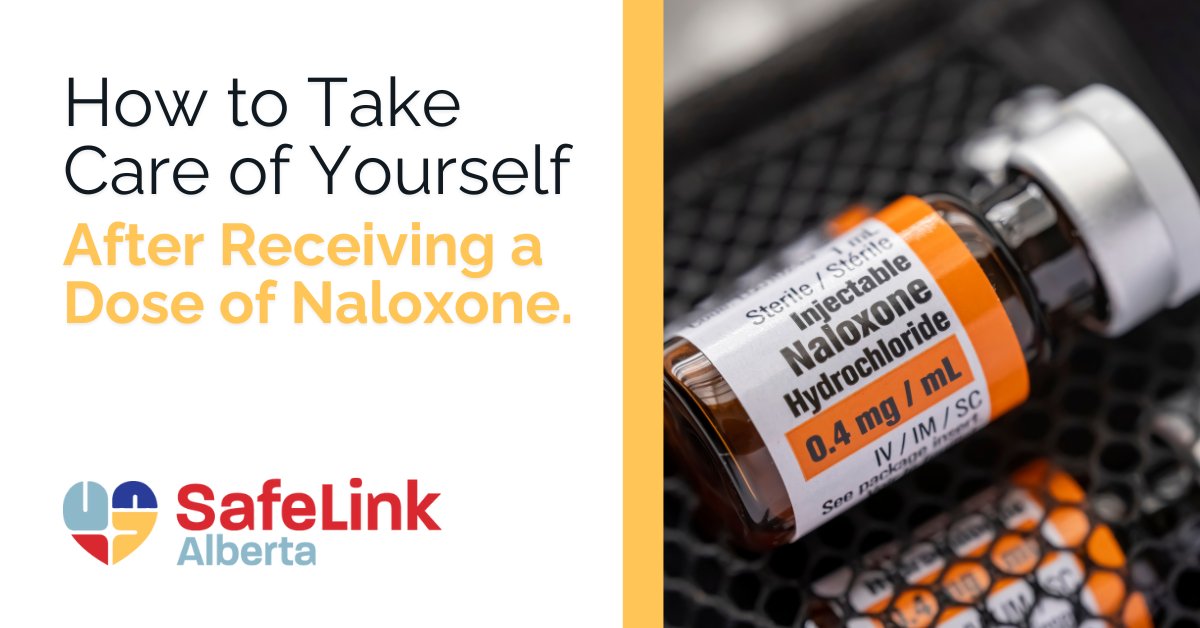Experiencing or witnessing a poisoning can be emotionally overwhelming. It’s crucial to address both the physical and emotional aspects of such an experience. Here’s a comprehensive guide on what to do and expect after an incident, including post-Naloxone aftercare and self-care tips.
Take Care of Yourself
Witnessing, responding to, or experiencing a poisoning can be emotional. Feeling overwhelmed is normal. Remember to take the time to take care of yourself.
Post Naloxone Aftercare
You should stay with someone for at least the first two hours after experiencing a poisoning.
“A person surviving an overdose should never be left alone, but rather be followed up by the health services. Follow-up after a life-threatening overdose should generally last for at least two hours.”1
When should I seek medical attention?
We understand that there are a lot of complex reasons why folks may not want to go to the hospital, but there are some situations where seeking medical assistance is necessary. If you are experiencing severe nausea and vomiting, you cannot have a bowel movement or urinate, or your skin and the white of your eyes turn yellow2, please seek medical attention. Experiencing a poisoning is a life-threatening situation if not treated properly.
How can you care for yourself at home?
Being Naloxoned can put your body into withdrawal. These symptoms can include nausea, sweating, chills, diarrhea, stomach cramps, and muscle aches. Withdrawal can last up to several weeks, depending on which opioid you took and how long you took it. You may feel very ill, but you probably aren’t in medical danger.3
- Your doctor may give you medicine to help you feel better. To help you get through withdrawal, you can also:
- Get plenty of rest.
- Drink plenty of fluids.
- Stay active, but don’t overdo it.
- Eat a healthy diet.
- If you had a tube in your throat to help you breathe, you may have a sore throat or hoarseness that can last a few days. Sip liquids to help soothe your throat.
- Having an overdose puts you at a higher risk of having a second one. Take your medications as prescribed. Do not mix alcohol with medicines that make you tired, like sleeping pills or muscle relaxers.
- Do not drive if you feel sleepy or groggy while you recover from an overdose.
- Talk to your doctor or pharmacist about a take-home naloxone kit. A kit can help and can even save your life if you have taken too many opioids. You can get a naloxone kit without a prescription at most drugstores or through a community Take Home Naloxone program.
How long does it take to recover from an overdose?
This will depend on several things, first and foremost, what drug or combination of substances a person has taken and in what quantities. Recovery time will also be affected by their age, general health, medical history, any medications they may be on, and their body’s resilience to drugs at the overdose.
Finally, in severe cases, it will depend on how long a person remains in a critical condition before the arrival of medical help. Sadly, complete recovery may be difficult if lasting damage has been done.
In the absence of severe damage to inner organs or the brain, a person may manage to recover within days or a few weeks at most. But some symptoms, particularly after an opioid overdose, may take much longer to heal.4
How long do overdose symptoms last?
While some symptoms can be relieved rapidly- a naloxone injection, for example, can alleviate the effects of an opioid overdose- other symptoms can persist for weeks or months. Common ones are gastrointestinal problems, memory loss and difficulty concentrating, disrupted sleep patterns and sub-optimal physical functioning, and mental health issues.5
What happens after you overdose?
After an overdose, a range of symptoms that affect both cognitive and physical functions begin to appear. Opioids, benzodiazepines, stimulants, and alcohol all cause slightly different symptoms, but there are several common signs of an overdose. Some indicators of mental function impairment are:
- Confusion; for example, people may not know where they are or recognize people they know.
- Slurred speech, or the person talking to themselves.
- They are unaware of what is happening around them, appearing in their little world or bubble.
- Passing out, either losing consciousness or being unresponsive to loud noises or attempts by others to wake them.
- Hallucinations.
- Extremely uncharacteristic behaviour (aggression, psychosis)


Need Additional Support?
SafeLink Alberta offers a range of support services for people who use substances. We have offices in Calgary and Medicine Hat. Get in contact with us or visit one of our offices to access our services:
Footnotes
- Lobmaier, P., Bukten, A., & Clausen, T. (2020). Aftercare for overdose survivors during the first hours following an intoxication: A review of the literature. ↩︎
- Anderson, L., Sinha, S., Durbin, K., Entringer, S., Stewart, J., Thornton, P., Pope, C., Puckey, M. (2024, March 3). Adult Overdose. https://www.drugs.com/cg/adult-overdose-aftercare-instructions.html ↩︎
- MyHealthAlberta. (March 22, 2023). Opioid overdose: Care instructions. https://myhealth.alberta.ca/Health/aftercareinformation/pages/conditions.aspx?hwid=abo8977 ↩︎
- Cirque Lodge. (2024). How long does it take to recover from an overdose?. https://www.cirquelodge.com/blog/how-long-does-it-take-to-recover-from-an-overdose/ ↩︎
- Cirque Lodge. (2024). How long does it take to recover from an overdose?. https://www.cirquelodge.com/blog/how-long-does-it-take-to-recover-from-an-overdose/ ↩︎
Sign-up for our newsletter for more content like this!
Please click the button below to provide your consent to receive messages SafeLink Alberta. This is important so you don’t miss out on updates about our events, presentations, programs and services.
Thank you!
By submitting this form, you are consenting to receive marketing emails from: . You can revoke your consent to receive emails at any time by using the SafeUnsubscribe® link, found at the bottom of every email. Emails are serviced by Constant Contact

